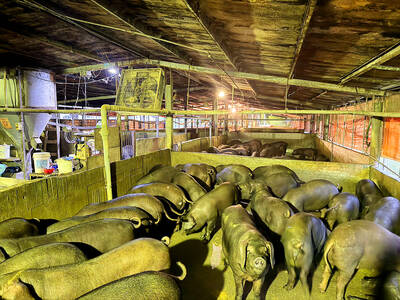Chinese investment occurs in many countries throughout the globe, but it has long been subjected to restrictions and controls in Taiwan. Despite this, in recent years, there have been a number of controversial cases over which a cloud of suspicion continues to hang, in which these restrictions are being circumvented in increasingly subtle ways. Whatever the actual motive behind Chinese investment, government departments, including the Ministry of Finance, the Financial Supervisory Commission and the Mainland Affairs Council, should be on a heightened state of alert and doing everything within their power to monitor this all-pervasive Chinese investment. In addition to employing strict verification and vetting procedures, the government should also ensure stiff penalties are in place to deal with any contravention of the rules and regulations.
Nan Hai Corp, one of several members of a consortium that was awarded the “Taipei Twin Towers” development project, is suspected of having links to Chinese investment entities. The Investment Commission has suspended the company’s continued participation in the project and requested clarification. The thorny issue of Chinese investment is once again in the spotlight.
The government has not comprehensively prohibited Chinese investment into the domestic economy, but has instead opted for a regulatory approach. Fund managers and investment institutions must go through the Chinese qualified domestic institutional investor program, while individual Chinese investors or Chinese investment institutions are forbidden from directly investing in Taiwan’s stock market. There are also restrictions on the amount that can be invested, and any direct investment into Taiwan must by vetted by the Investment Commission. Furthermore, a Chinese investor cannot invest in a Taiwanese company that operates within a restricted industry.

Photo: George Tsorng, Taipei Times
照片:自由時報記者叢昌瑾
That is, Chinese investment into Taiwan is subject to restrictions and controls. A problem arises when Chinese investment enters Taiwan through the back door, is routed through other companies or enters Taiwan in the guise of non-Chinese foreign investment. Whether the motivation is to pass off mainland Chinese investors as Hong Kong investment institutions or whether the goal is to conceal a Chinese investor that is a majority (controlling) shareholder, it goes without saying that this kind of activity is illegal under Taiwanese law.
Some people argue that Chinese investment is no different from foreign investment by other countries. Nevertheless, the government treats Chinese investors as extremely high-risk and uses every means at its disposal to obstruct them. In practice, though, this means blocking only illegal Chinese investors. From the government’s perspective, if there is no ulterior motive at play, why would Chinese investors feel the need to go to the trouble of — and assume the risk of — circumventing Taiwan’s regulations?
In order to deal with Chinese investors undeterred by the threat of fines and the widespread nature of Chinese investments, legislators last month passed the third reading of an amendment to the Act Governing Relations Between the People of the Taiwan Area and the Mainland Area. Chinese investors that breach the rules can now be fined up to a maximum of NT$25 million (approx. US$800,000). The authorities should step up inspections to ensure that illegal Chinese investors are left with no place to hide and ensure that they catch any transgressors that have fallen through the net. The government must also employ new laws where necessary to create stronger penalties that are essential for an effective deterrent.

Photo courtesy of Taipei Department of Rapid Transit Systems
照片:台北市捷運工程局提供
(Translated by Edward Jones, Taipei Times)
中資在世界各國攻城掠地,已經對中資設下重重管制關卡的台灣,近年仍傳出多起相關爭議事件或疑雲,且手法更為細膩;無論這些中資目的為何,從經濟部、金管會到陸委會等主管機關,面對無孔不入的中資入侵,都必須拉高戒備、全面防堵,除了採取實質認定、嚴格審查,更要予以重懲。
台北雙子星案得標團隊之一的南海控股,因為涉有中資疑慮,而被投審會要求補件卡關,讓中資問題再度引起各界關注。
首先,台灣並非全面禁止中資來台,而是要「按照規定」來,比如:證券投資要透過中國QDII(合格境內機構投資者),中國自然人或一般法人不能直接買台股,且有額度限制;若是直接投資,就要依規定通過投審會審查,投資對象不能為禁止產業等。
也就是說,中資來台是受到管制,而問題出在有的中資走偏門,繞道或以「假外資」名義登台,姑且不論其目的為何。假冒港資或外資,或是隱匿中資為具控制力的大股東,不用說,這當然就是違法了。
有人說,中資也是外資,但政府把中資當成毒蛇猛獸,千方百計阻擋。事實上,這是違法投資的中資,況且,若沒有特殊目的,為何要如此大費周章,干冒違法風險,就是要投資台灣?
面對罰不怕、且無孔不入的中資,立法院在今年四月三讀通過台灣地區與大陸地區人民關係條例修法,中資違法來台最重可罰兩千五百萬元。未來主管機關除了嚴加把關,讓中資無所遁形外,對於漏網之魚、偷溜進來的中資,更應該適用新法予以重懲,才能發揮嚇阻效應。
(自由時報記者王孟倫)
Follow up
讀後練習
Questions (True or False)
1. One of the lead contractors involved in “Taipei Twin Towers” development may have breached foreign investment regulations.
2. The fine for illegal foreign investment activity has been raised to a maximum of NT$250 million.
3. The author believes Chinese investment does not pose a national security threat to Taiwan.
4. The author believes the government should do more to deter illegal Chinese investment into Taiwan’s economy.
(Edward Jones, Taipei Times)

For many people in Taiwan, childhood memories of rural life include pig pens standing beside family homes. Leftover rice, vegetable scraps and soup from daily meals were poured into buckets and fed to pigs. This practice of feeding pigs with household food waste was once a common way of life, both an economic choice and an expression of agricultural society’s deep respect for conserving resources. From a practical standpoint, pigs are omnivorous animals capable of efficiently digesting food scraps that humans can no longer eat. For rural households, food waste cost almost nothing, yet it could be converted into pork, a

Tango unfolds in a dimly lit room, where a haunting melody ushers two dancers into a close embrace. Here, music and movement merge into a silent yet passionate conversation, expressing longing, memory and shared purpose. What makes tango truly magical is the deep interaction and spontaneous improvisation between partners. Tango began in the late 19th century in Buenos Aires, Argentina’s bustling capital. Born in the poor working-class neighborhoods and busy port areas, this dance emerged from a melting pot of cultures. European immigrants, African slaves and local residents all contributed to its unique character. From these rich influences, tango

A: What show are you watching online? B: I’m watching “Fly Me to the Moon & Back” – an exhibition launched by the Taipei Music Center (TMC) to commemorate the late singer Tom Chang. A: Known for his sky-high notes, Chang is praised as one of the best singers in the 1990s. His death at the age of 31 was a major loss indeed. B: And I’m so glad that we went to the TMC’s 90s-themed concert last Friday. I finally saw the iconic “Godmother of Rock” WaWa perform live. A: This year-end show also featured singers Princess Ai, Bii, Wayne Huang, PoLin and

A: Apart from the Taipei Music Center’s exhibit and concert, US pop rock band OneRepublic and rapper Doja Cat are touring Kaohsiung this weekend. B: OneRepublic is so popular that after tonight’s show at the K-Arena, they are set to return to Taiwan again in March next year. A: And Doja will also perform at the same venue on Sunday, right? B: Yup. Her collab with Blackpink’s Lisa and singer Raye for the song “Born Again” has been a huge worldwide success. A: Doja even made it on Time magazine’s “100 Most Influential People” list in 2023. She’s so cool. A: 本週末除了北流的特展和演唱會外,美國男團共和世代和饒舌歌手蜜桃貓朵佳也將來台開唱。 B: 共和世代因太受歡迎,繼今晚高雄巨蛋的演唱會後,預計明年3月即將再度來台巡演唷。 A: 朵佳本週日將在同場地開唱,對不對?